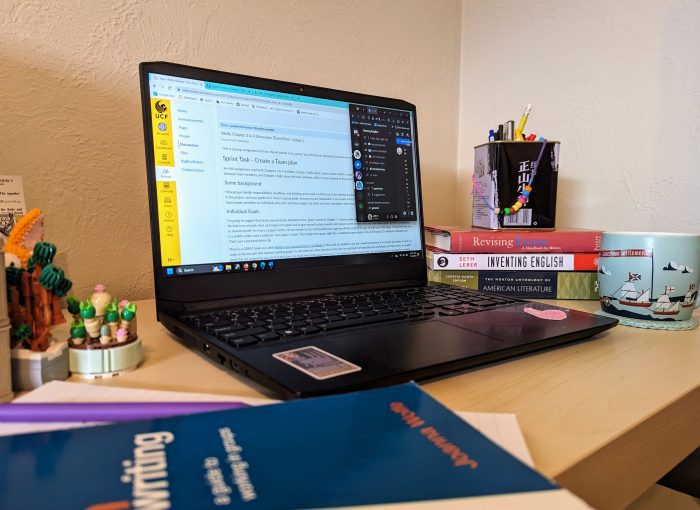by Ashley Garland
I transferred to UCF as a fully remote student in fall of 2021. It was the first full semester post-COVID-19 lockdown, and most instructors had already made the switch back to face-to-face instruction. Having weighed the benefits of remote learning against the inconveniences of returning to in-person classes, and knowing UCF’s online degree program is one of the best in the country, I embraced my life of digital learning. The flexibility was great—just give me a laptop and, Wi-Fi permitting, the world is my lecture hall. I appreciated the lack of a commute but, as with anything else, there were downsides. One of the biggest, though I didn’t realize it at the time, was how it limited my opportunities to build relationships with my peers and professors.
Only about nine percent of UCF students are fully remote. Is it any surprise that it’s difficult for us to find each other?
With nearly seventy thousand enrolled students, UCF has one of the largest student populations of any university in the U.S. However, while around eighty-seven percent have taken at least one online course, only about nine percent of UCF students are fully remote. Is it any surprise that it’s difficult for us to find each other? It also shouldn’t be surprising that community—the one thing I have most missed in my experience at UCF—improves student outcomes. When drop-out rates in online tracks can exceed those of traditional programs by as much as twenty percent, remote students should really seize every chance they get to improve their odds of success, no matter how challenging it may seem.
Fortunately, course designers at UCF are encouraged to build their courses with student connection in mind, and things like class discussions, video lectures, and quick feedback from instructors all help us to feel more “present” in a remote learning environment. Even so, I’ve taken courses that felt more like one-on-one tutoring than classes at a university. Those classes got the job done, of course, but I’ve also experienced the opposite: courses where student connection and collaboration completely reshaped my perspective on the importance of community as a virtual student.
One of those courses was Client-Based Project Management, taught by Dr. Jane Vaughan. All I knew about it when I enrolled was that it would fulfill a requirement for my technical communications minor. Then I read the syllabus, and realized the course consisted almost entirely of group work with a real client. How was I supposed to work with a client? Or even find one? Of what possible use could a group of undergrads be to an actual business? I was horribly intimidated.
What I didn’t know yet was that, while these projects were a huge part of our final grades, the parameters for each “deliverable” were between the students and their clients, aside from a minimum required scope that takes most of a semester to complete. This was because the final product wasn’t the real focus of the course. The chapters of our small textbook, which we discussed in regular Zoom lectures with Dr. Vaughan, covered topics like handling conflict, distributing tasks equitably, and ensuring all group members were heard. Briefly, we were taught to form and maintain friendly, respectful, and effective working relationships. In a way, the project itself was almost a by-product. It was an entry in our portfolios if all went well, of course, but more importantly, at least to me, it was proof of our ability to work as a team.
Now, I’m sure I’m not alone in having had a few bad experiences with group projects. Luckily, if counterintuitively, the nature of the course took a lot of the pressure off. We were supposed to get along. We had to. We were stuck working with each other until finals on a complex project that we essentially had to teach each other to do. Dr. Vaughan gave us the tools to connect, then stepped back to supervise—attentively, of course. And so we connected. As the term passed, through daily chatting, weekly video meetings, and lots of checking in with each other, we formed a solid, supportive group. I belonged in this group, and because my presence and participation mattered to more people than just myself, by the end of the semester, the course I’d most dreaded at the beginning had turned out to be the most satisfying three credit hours I’d earned since enrolling.
Most classes can’t be structured this way, for obvious reasons; training for literary analysis or calculus or research is a different process than training to build a cohesive group. That doesn’t mean we can’t feel a sense of belonging in our classes, though—even the remote ones, and even the ones that feel like private lessons. If you get a message at the start of term with a Discord or GroupMe link, click it. If nobody sends one out, don’t be shy about doing it yourself! Check the UCF Student Hub on Discord and join a channel that interests you. Schedule Zoom meetings with classmates you trust and keep each other company while you study. When it comes to finding a “home” here, all UCF can really provide us students with are opportunities. It’s up to us to take advantage of them or create our own—on campus or online.




